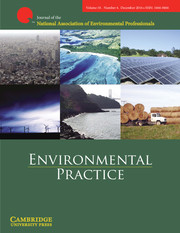Article contents
Working and Lower Middle ClassWomen and Obstacles toEnvironmentally Related PublicMeeting Participation
Published online by Cambridge University Press: 20 June 2005
Extract
Public meetings that are attended by a broadly representativecross-section of the potentially affected public are more likelythan those that aren't to provide decision makers with an understandingof the range of citizen concerns regarding a potential decision.Previous research suggests that working and lower middleclass women are particularly unlikely to attend environmentallyrelated public meetings. This decreases the likelihood that decisionmakers will fully understand citizen concerns as a result ofthese meetings. This article reports on the results of a small qualitativestudy aimed at understanding why these women are lesslikely to attend. The interviewed women were socially oriented intheir skills, activities, and sense of self-confidence. This, alongwith the way that these women conceptualized "environment,"suggests that they are unlikely to see themselves as valuable participantsin a public meeting on an environmental issue. Other obstaclesto their participation, including a lack of time and self-confidence, pertained more to women in one life stage than another.Environmental managers may attract more working andlower middle class women by making our suggested choices regardingmeeting technique, attributes, and advertising.
Information
- Type
- Research Article
- Information
- Copyright
- © 2002 National Association for Environmental Professionals
- 1
- Cited by

